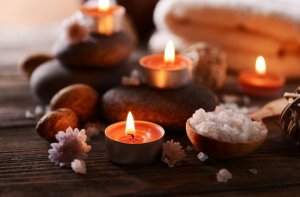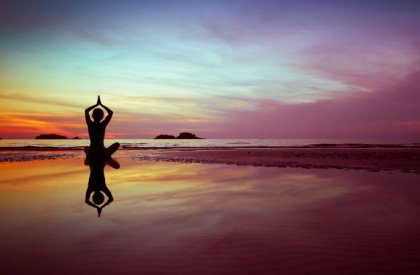The Best Person to Heal Yourself Is You

When I began my training to become a yoga instructor, I learned that one of the fundamental guidelines of yoga is “ahimsa.” Ahimsa means “non-violence.” Often, we only think of this as not being aggressive towards others, but we are not always conscious of the violence that we inflict upon ourselves and our own bodies.
Paradoxically, I learned this from Indian medicine but backwards. I have learned “by contrast” that there are things that are violent for my body. For one week, I have followed an apparent detoxification treatment which has only resulted in a major system blockage in my body from which I am now recovering.
I am recovering myself by myself, treating my body with lots of love, caring, gentleness, respecting my sensitivity. I have learned that we should be the first ones to respect our own sensitivity.
This is not just a subjective understanding. I often tell my clients that we have to have a deep understanding of the way our nervous system and brain work.
Our bodies have natural powers of healing and regeneration that only activate themselves in response to rest and relaxation, not to stress. When we are stressed, all of our physical mechanisms of healing and renewal become blocked, or diminished to their minimal strength, as does our immune system and ability to absorb nutrients.
When this occurs, we need to respond with softness, care, listening to our bodies, and by taking the “less is more” perspective. We must allow our bodies to heal in a natural way so that our our physical and mental mechanism can reorganize itself in a healthier way and once again tend to peace and well-being, happiness.
I often find myself with people who have gone through the clashing of therapies and treatments that are too harsh and intense, and that often leave the person feeling even more broken than before they began.
If you find yourself in a place where you need healing — whether physically, emotionally or spiritually — before jumping into a detox or other extreme treatment, it’s helpful to ask yourself these simple questions.
In which areas of my life am I trusting more in the voices of others than in my own voice?
In what moments am I trusting my well-being to others instead of listening to my own body?

What parts of my inner self do I act violently towards?
What habits do I have that are attacks on my own self?
Spend some time answering them, and do so honestly. Once you have come to some answers, you have to apply this knowledge to your life and take action.
Often, the answers you arrive at may encourage you to stop frequenting a certain place, or a certain friendship, or maybe try and see what happens if you put a treatment or therapy on hold that you feel is being too aggressive. You could decide to stop cramming yourself between the four walls of a gym with your music blasting to take a walk through a park in the sun, to listen to the birds and feel alive and at peace, here and now.
Abandon things that causes you pain, with the promise that, in the future, it will be for the best. Give yourself permission to take care of yourself with a kindness and love that surprises you, because you are your most valuable possession.
When I began my training to become a yoga instructor, I learned that one of the fundamental guidelines of yoga is “ahimsa.” Ahimsa means “non-violence.” Often, we only think of this as not being aggressive towards others, but we are not always conscious of the violence that we inflict upon ourselves and our own bodies.
Paradoxically, I learned this from Indian medicine but backwards. I have learned “by contrast” that there are things that are violent for my body. For one week, I have followed an apparent detoxification treatment which has only resulted in a major system blockage in my body from which I am now recovering.
I am recovering myself by myself, treating my body with lots of love, caring, gentleness, respecting my sensitivity. I have learned that we should be the first ones to respect our own sensitivity.
This is not just a subjective understanding. I often tell my clients that we have to have a deep understanding of the way our nervous system and brain work.
Our bodies have natural powers of healing and regeneration that only activate themselves in response to rest and relaxation, not to stress. When we are stressed, all of our physical mechanisms of healing and renewal become blocked, or diminished to their minimal strength, as does our immune system and ability to absorb nutrients.
When this occurs, we need to respond with softness, care, listening to our bodies, and by taking the “less is more” perspective. We must allow our bodies to heal in a natural way so that our our physical and mental mechanism can reorganize itself in a healthier way and once again tend to peace and well-being, happiness.
I often find myself with people who have gone through the clashing of therapies and treatments that are too harsh and intense, and that often leave the person feeling even more broken than before they began.
If you find yourself in a place where you need healing — whether physically, emotionally or spiritually — before jumping into a detox or other extreme treatment, it’s helpful to ask yourself these simple questions.
In which areas of my life am I trusting more in the voices of others than in my own voice?
In what moments am I trusting my well-being to others instead of listening to my own body?

What parts of my inner self do I act violently towards?
What habits do I have that are attacks on my own self?
Spend some time answering them, and do so honestly. Once you have come to some answers, you have to apply this knowledge to your life and take action.
Often, the answers you arrive at may encourage you to stop frequenting a certain place, or a certain friendship, or maybe try and see what happens if you put a treatment or therapy on hold that you feel is being too aggressive. You could decide to stop cramming yourself between the four walls of a gym with your music blasting to take a walk through a park in the sun, to listen to the birds and feel alive and at peace, here and now.
Abandon things that causes you pain, with the promise that, in the future, it will be for the best. Give yourself permission to take care of yourself with a kindness and love that surprises you, because you are your most valuable possession.
This text is provided for informational purposes only and does not replace consultation with a professional. If in doubt, consult your specialist.







